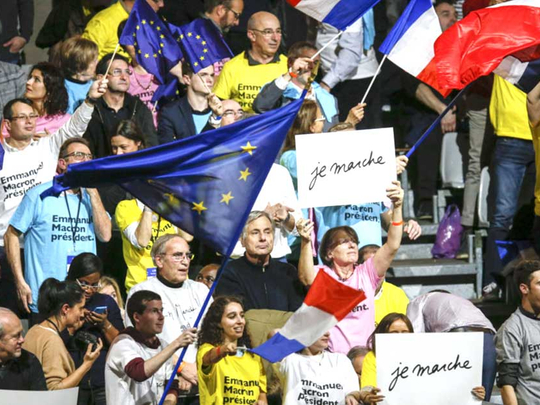
Europe’s political leaders met in Malta on Friday for the first summit of what could be of the most tumultuous ever years for the EU. The bloc expressed concern about the early actions of US President Donald Trump, and continued mapping out how the continent best moves forward post-Brexit in what could be another highly uncertain election year with populist forces potentially making big gains across the continent.
Some 60 years after the Treaty of Rome, which was one of the EU’s founding treaties, European Council President Donald Tusk said that the challenges facing the EU are now “more dangerous than ever”. He identified 3 key threats “which have previously not occurred, at least not on such a scale” that the EU must tackle.
The first two dangers relate to the rise of anti-EU, nationalist sentiment across the continent, plus the “state of mind of pro-European elites” which Tusk fears are now too subservient to “populist arguments as well as doubting in the fundamental values if liberal democracy”. The EU chief is conscious here that, following Brexit, and Trump’s election, it is continental Europe which will provide a lodestar this year on whether right-wing populism will continue to find fertile electoral ground.
In elections in countries beginning with The Netherlands in March, where polls indicate the far-right Freedom Party could emerge as the largest single party, left-wing and centrist parties are under pressure from insurgency parties championing Eurosceptical, anti-immigrant platforms. It is France, however, which alongside Germany has traditionally been the ‘twin-engine’ of EU integration, which will be the key election to watch in the continent.
The reason is the far right, National Front candidacy of Marine Le Pen who has called for closer ties with Russia, and questioned need for Nato in the 21st Century, asserting that it now exists to serve “Washington’s objectives in Europe”. She is running a Trump-style populist campaign and has said that “2016 was the year the Anglo-Saxon world woke up [with Brexit and Trump’s victory]...I am sure 2017 will be the year the people of continental Europe wake up”.
Le Pen has called for a French referendum on the country’s EU membership and, while she is not currently the favourite to win, she stands a realistic shot of getting to the second-round run-off election in May. Tusk and other EU leaders are well aware that if she pulls off an upset victory this Spring, it would be an even more savage blow to the bloc than Brexit, not least given France’s membership of Eurozone.
In Germany, incumbent Angela Merkel is presently tipped to win power again, but is facing her toughest ever election fight, and could yet lose out, partly because of growing support for the far-right Alternative for Germany. This group founded less than a half decade ago as an anti-euro group has, since then, tapped into discontent toward her immigration policies, and is polling at almost 15 per cent, nationally, with seats in more than half of state legislatures.
The third threat cited by Tusk, this time external to the EU, is what he calls the new geopolitical reality that has witnessed an increasingly assertive Russia and China, and instability in the Middle East and Africa which has driven the migration crisis impacting Europe. Intensifying this is the new uncertainty coming from Washington with the Trump administration’s questioning of much of the post-war tenets of US foreign policy, including broad-based support for European integration.
With the longstanding antipathy of Russia to the EU, plus newfound critiques from Washington under Trump, Tusk warned this week against those who believe that “the disintegration of the EU will lead to the restoration of some mythical, full sovereignty of its member states, but [instead] to their real and factual dependence on the great superpowers...Only together can we be fully independent”. Interestingly, it was Trump who received particular scorn at the summit with, for instance, French President Francois Hollande stating “it cannot be accepted that there is, through a certain number of statements by the US president, pressure on what Europe ought to be or what it should not be”.
Long and shorter-term solutions to this potentially existential crisis for the EU were discussed at Malta. Tusk believes this agenda must centre around improving the internal and external security of Europe, while also improving the socio-economic welfare of its citizens through socially-inclusive growth and a new series of trade treaties with interested partners.
While the latter agenda is, however, divisive in Europe as was witnessed last year by the near collapse of the trade deal with Canada, there is growing consensus for a package of measures to enhance security and border protection to emphasise the resilience and integrity of the continuing EU project. Tusk has said that “people expect that the EU...will again be a guarantor of stability, security and protection”.
Moreover, there is also an added political ‘window of opportunity’ to move forward on this agenda with High Representative of the EU for Foreign Affairs and Security Policy, Federica Mogherini, having launched last June a new global strategy on foreign and security policy, the first such European document since 2003.
To this end, several European leaders have already called for a new, 21st Century European security pact. This highlights that a carefully crafted package of measures, including greater EU intelligence cooperation and strengthening Europe’s border force, and increased defence spending, could secure significant political traction.
Taken overall, the summit showed EU leaders are scrambling to come to terms with intensifying internal and external challenges, including the Brexit vote, which will continue to set the political weather across the continent. Decisions taken in coming months, including on the security front, will define the longer-term political and economic character of the bloc in the face of what threatens to become, collectively, an existential threat to the future of the union.
Andrew Hammond is an Associate at LSE IDEAS (the Centre for International Affairs, Diplomacy and Strategy) at the London School of Economics.










